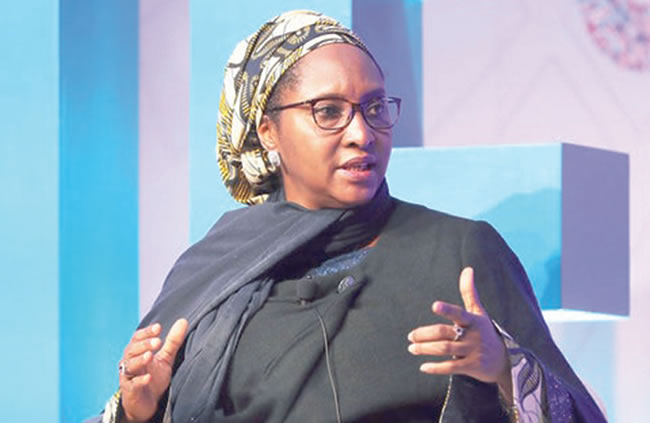INVESTIGATIONS have shown that debt service, poor revenue outcomes and lax budget implementation are going to be a drag to the realisation of the 2022 budget. President Muhammadu Buhari last week, before a joint session of the National Assembly, unveiled a record N16.39 trillion.
“Budget of Economic Growth and Sustainability” for 2022, but .experts have expressed dismay over non-compliance with full implementation of national budgets in line with existing appropriation laws.
They say the implementation of the proposed N16.39 trillion 2022 budget may not be different given the fact that several past budgets never realised up to 80 per cent implementation threshold. An economist, Tope Fasua, faulted the lack of innovation in government and taking the easy way out of economic underdevelopment by relying heavily on crude oil sales and borrowing to fund annual budgets.
Fasua said Nigeria is still trapped under the yoke of heavy borrowings.
“The budget has not gone out of the vicious circle of crude oil being the main source of revenue for this country. We are still talking about crude oil, how many barrels we can sell and how many barrels we can produce.
“Nigerians are waiting for the day there would be out-of-the-box thinking as far as our budget is concerned where we will be able to see new thinking about revenue expectations of our budgets. We have not got to that point.
“The way we are going now, the fear is that will we may never get out of the budget deficit circle. Nigeria is the second-lowest country in terms of per capita budget, meaning the federal budget is divided by the population, will amount to little. We are not better than Congo.”
He, however, commended the Federal Government for presenting the budget early to the National Assembly.
The Chief Executive Officer (CEO) of Economic Associates, Mr Ayo Teriba said, “It is not clear what we should make of the well-established fact that interest payments on debt are perennially consuming nearly 100 per cent of the revenue available to the Federal Government of Nigeria.”
In the same way, supranational bodies like the IMF and the World Bank have expressed concerns that high debt service to revenue ratios crowd out spending on economic and social priorities and urged the government to cut subsidies and/or increase taxes.
Available records show that the Federal Government made a total of N3.25 trillion in 2020, according to a review of the budget performance of the 2020 Appropriation Act.
For 2021, actual revenues were 34per cent below target as at end of July.
There was under recovery on petroleum products and this has been a major reason for decline in government revenue.
The 2022 budget deficit is to be financed through borrowing (N5.01 trillion), loan draw-down (N1.16 trillion) and Privatisation Proceed (N90.73 billion) Strategy to improve revenue includes enhanced tax and excise revenues through policy reforms and review of tax waivers and concessions.
Meanwhile, the minister of Finance, Zainab Ahmed said a total sum of N10.132 trillion revenue is expected to be raked in within the year under review to fund the budget.
Experts believe that given past performance of past budgets the 2022 budget seems unrealistic. For instance, in 2018, the Federal Government generated N3.48 trillion as revenue.
Revenue from oil contributed N1.96 trillion; non-oil contributed N1.12 trillion, and independent funding was N395.2 billion.
In 2019, The Federal Government made a total revenue of N3.86 trillion. Although the Federal Government had projected revenue of N5.84 trillion for 2020, actual revenue was N3.25 trillion. Interestingly, the projection on FG’s share of revenue available for the budget was also increased by N1.8 trillion to N10.1 trillion (an increase of 160.0 per cent over 2020 actual), to keep the deficit gap at N6.3 trillion.
Experts believe that given FG’s track record of revenue underperformance over the years and the absence of any major reform to drive this projection, analysts believe time will soon tell on the achievability of the revenue projection.
Last Monday, the Federal Ministry of Finance, Budget, and National Planning (FMFBNP) published half year (H1):2021 budget implementation report which revealed that FG’s total retained revenue underperformed by 30.4 per cent to print at N2.3 trillion.
This was mainly dragged by shortfalls in revenue from oil & gas (-44.4 per cent) and other unsustainable sources such as signatory bonus & others (-61.7 per cent). From the allocation, defence and security got N2.41 trillion (15 per cent); infrastructure N1.45 trillion (8.9 per cent); education N1.29 trillion (7.9 per cent).The United Nations Educational, Scientific and Cultural Organisation (UNESCO) recommended that countries should allocate at least 15-20 per cent of the budget to education.
The Federal Government also allocated N820 billion (five per cent to Health and Social Development and Poverty Eradication got N863 billion (5.3 per cent) of the entire allocation. Economists believe that debt begins to hurt economic growth when the total debt-GDP ratio exceeds 90 per cent. Based on this threshold, Nigeria’s current debt level is harmless.
Political economist and former presidential candidate, Prof. Pat Utomi, attributed the high debt servicing ratio to lack of discipline in public administration in Nigeria. He said, “We are permanently fire-fighting. We have no long-term vision for our country. So, politicians tend to act ‘for this moment, for this tenure.’ They don’t often think about what will happen in five years or ten years; that is why we have these kinds of borrowing. “As far as most politicians are concerned, the problem will come when they are gone. So, it becomes a problem for those who have to deal with it. What has been done in the past is using fiscal responsibility laws.
“There are states in the US that have balanced budget law that says you can’t spend beyond what you earn. Obviously, that can limit the flexibility of growing the economy and all of that but there should be certain guidelines.” Utomi said that the nation had built a big government, which is a huge cost for a poor country. And since the government has to maintain expenditures in light of falling revenue, the government would continue to borrow more, he added. Utomi said,
“The consequence is huge. For instance, we are seeing some countries being taken over by China due to inability to pay debt. “We may wake up one day and find out that one of our infrastructures like Apapa ports belongs to a foreign government due to our borrowing.
“There must be a dramatic trimming of costs in the country and a dramatic push for production. Right now, we are driven by revenue from crude oil. The outcome will be disastrous if nothing is done.
“If we don’t have any money to pay salary, for maybe five years, because the entire money is used to service debt, there may be one to two years without salary for civil servants. It is not new, it had happened. If that becomes a norm nationwide, there will be more violence, crime, hunger, and instability.
“In the short run, we need an open debt conversation and strategies. In the long run, we need to restructure our system.”
The Chief Executive, Economic Associates, Dr Ayo Teriba, said that high debt servicing to revenue ratio was not good.
He said for a country of 200 million people, money was needed to be invested in the populace. Teriba said if the main share of government’s revenue goes to servicing debt, then the nation would fall into a debt trap.
He said, “The Nigerian government borrows in the worst possible way and in a very outdated manner. This causes a backlash to the government. Because Nigeria’s debts are not linked to any assets, we just go to the treasury bill market and borrow, at any rate that anybody wants to give you.
“There are many other countries who borrow more than what Nigeria is borrowing and don’t have any problem paying back. They borrow intelligently and efficiently, in a way that their debts service themselves.
“A more efficient way of borrowing is for the Federal Government to migrate all the debts to asset-linked debts. This means structuring the borrowing transaction like investments. There must be an underlying asset to which borrowers can use to recover the principal they gave the country plus profit.”
Teriba added that the nation should focus on equity, and if equity investments were focused on, it would reduce debt servicing burden on the nation, as there was no pay back or service clause on equity.
He added, “Finally, it is not just debt and equity you can get from assets; you can get revenue from assets, by leasing or selling these national assets, just like what the British government has been doing.
“So, what the Federal Government should diversify is not the economy or exports; it is its debt or financial portfolio.”
Nigerians should be worried about the cost of debt servicing because it is already affecting tgem.
According to Teriba, Nigeria should aggressively restructure its debt portfolio by replacing interest paying commercial bonds with interest-free commercial bonds on a wholesale basis to drastically reduce or eliminate the N4.9 trillion annual average interest payments that is projected in the 2022-2024 MTEF.
Rather than issue interest paying bonds to fund infrastructure, we should create special purpose vehicles for packaging infrastructure assets for interest-free financing through asset-linked non-convertible or convertible bonds. Ideally, this should happen in a rule-based fiscal regime with an independent advisory fiscal commission as watchdog.
YOU SHOULD NOT MISS THESE HEADLINES FROM NIGERIAN TRIBUNE
Lagos Is Second Least Liveable City In The World For 2021
Lagos is the second least liveable city in the world for the year 2021. This is according to the most recent annual ranking put together by the Economist Intelligence Unit (EIU)…
CLAIM 1: A Twitter user claims UNICEF said any efforts to block children from accessing pornography might infringe their human rights.
VERDICT: MISLEADING!






